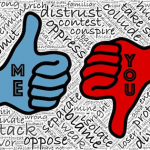
KERRY CONNELLY, blogger at Jerseygirl, Jesus (Progressive Christian): I just wrote this piece on my blog because a question came to my mind the other day: what if the first sin wasn’t Eve eating the apple? What if it was patriarchy?
REBECCA BRATTEN WEISS, blogger at Suspended in her Jar (Catholic): I think it would be interesting to discuss the concept of original sin, as Christian feminists. It is fascinating how so many stories about an original sin or hubris involve a transgressing woman. It seems as though wherever we look, we find humanity blighted in some way, and patriarchal powers trying to say it’s all the fault of women. Like victim blaming in rape cases. And of course in Genesis, Adam immediately puts the blame on Eve. I wonder if the story needs to be read from the angle of divine truth, as an instance of what fallen-ness does? Patriarchy = fallenness.
Kerry: Yes — all my life, when thinking about this story, and even re-reading it, I always had this image of Eve out for a stroll, encountering the serpent and being taken in by it, then running back to Adam and convincing him to eat the fruit. My reading almost gave Adam complete deniability — at the very least, he was less culpable. But when I re-read it this morning as I was writing, I saw something I never noticed before: ADAM WAS WITH EVE THE WHOLE TIME. (Sorry not yelling, just emphasizing). He was right there. He never tried to stop Eve, he never said, hey, not such a good idea, and he definitely partook of the fruit knowing full well what they were doing. They were both culpable.
Rebecca: Yes, I remember discussing this in scripture class! The professor’s angle was that Adam’s sin was in failing to protect his wife. But I wasn’t comfortable with that. He was never told “Hey, this is your little frail woman, protect her.” Instead she was bone of his bone, flesh of his flesh. They were supposed to be unified, but then in that case, he just hung back and let her do the talking with the serpent. Then blamed her afterwards. There was a failure of unity, I think, and then afterwards the scapegoating. Another angle is that the serpent opted to tempt Eve because women are weaker, but that’s stupid, because Adam was RIGHT THERE, as you say (and look, I’m shouting, too!).
Kerry: Lol. Yes, and what I also learned is that the word “helper” (as in, “it is not good for man to be alone, so I will make him a helper) holds absolutely no connotation of subordination. If anything, it means to help the way God helps, and offer protection — in this case against Adam’s loneliness. But what I’m enjoying playing with (and look — I’m no theologian and fully acknowledge that, but the thought is interesting to me) is that maybe the FIRST sin was that Adam named Eve woman. God told him to name the animals. But he never said specifically to name Eve — and by doing so, he automatically othered her and took ownership of her, when from the beginning, both were meant to have dominion in the world.
Rebecca: That is a truly fascinating idea. Because, of course, by claiming the right to name not only the creatures, but Eve as well, he a) ranked her among the creatures; b) arrogated to himself the special privilege of naming. And so men have looked back to that, to justify anything from male domination in law, to the special prerogative men have as writers or creators. I find it interesting, also, that the idea of the male as the “active principle” continues to endure even long after Aristotelian biology has been discredited. So men are expected to be the namers, the makers, the creators, and the fact that women are capable of creating whole human persons inside our bodies ends up not being regarded as “creative” or “powerful” but simply a nurturing duty.
Hmmm, I may have wandered slightly from the point. But I keep running into this among scholastically-educated Catholic males. They really do not like giving us credit for the amazing thing we do, growing a baby. Because we’re supposed to be passive.
Kerry: Yes — I was at a women’s conference this past weekend, and it was all about women doing theology and also about women “not doing what we’re ‘supposed’ to do” (like preach), and there was a lot of talk about God as Mother. I’ve come home and read so much more about this than I had before I went. It’s incredible to me how resistant many men are to this concept, as if it pokes at some very tender spot for them. I am not sure what is so threatening about God’s feminine side, when scripture is clear he holds attributes of both male and female.
I wonder why it is that even some women want to hold so fast to patriarchy? What makes it feel so safe for them, that equality does not offer?
Rebecca: I used to be very anti-feminist myself, and it’s interesting to look back at what went through my head. Part of it was that I felt obligated to defend what I’d been taught by many to believe was a venerable tradition that was associated with art and literature and philosophy. I felt that it was my duty, in magnanimity, to accept my place in this structure, and not “whine about it.” At the same time, I hated being forced into pre-set feminine roles, so I think I convinced myself that most women really WERE inferior, but that I was special – I could hang with the guys. It was a really bizarre mashup of recognizing certain realities, and being completely blind on others.
There’s also the protection factor. Women who uphold the patriarchy are rewarded by men in relationships, who want submission and femininity. They are rewarded with jobs and writing and speaking gigs, by groups who want to maintain the ideology. Rebel against this, and you’re out in the cold. Especially as a Christian feminist, because a lot of secular women will expect you to drop your religious affiliation or faith.
Kerry: Yes it’s true. Being both a Christian and a Feminist feels like dichotomy at times. I have an interesting situation, as unlike many Evangelicals (I’m not really Evangelical, I’m progressive, but my church is probably more Evangelical) I didn’t grow up in the church, really. And so I definitely grew up more feminist than Christian, although I always loved God and believed in God, and was fully enamored with Jesus. I didn’t make it “official” until my early twenties, and by than my feminism was deeply rooted. However, it DID hide for a long time, as I got entrenched in religion, and I am still in recovery from those early days of cult-like Christianity. Still a lot of healing happening.
Rebecca: It’s hard to get over cult Christianity. I wonder how long the super-ego guilt element lingers? I actually found that discovering Christian feminism really helped me be more at peace in my faith. It was valuable for me to learn about different ways of looking at scripture, seeing how God could be a woman’s ally even if men were trying to appropriate religious power for their own ends. As a Catholic, looking at Mary and many of the woman saints has been deeply enriching for me, to see that the path to God is often a path of liberation and fulfilment…not just “doing what guys say.” Some of the early orders of women religious were considered deeply threatening….groups of women living together, worshiping God, with no men to tell them what to do!
Kerry: Yes!! So many women subverting empires for God. One of the speakers at the event last weekend spoke on the women of Exodus, all of whom were rebelling against what the men or society told them to do, all for God’s purpose. It was so fascinating. And Sarah Bessey was there, too. She said men still walk out when she preaches.
It’s so infuriating, and I can only look at that kind of behavior and see a sort of pharisaical pride. Am I wrong there?
Btw — Sarah Bessey is my new BFF :- ) (kidding)
Rebecca: Yes, isn’t it cool to see how salvation history advances precisely because of the unruly behavior of women acting outside gender norms? I especially love how Rebekah tricks her husband, Ruth lies down at the foot of Boaz’s bed, and Esther enters the presence of the king. Oh, and Judith cuts off a general’s head. Don’t want to forget that one! The women of the Old Testament are the exact opposite of meek, submissive, dainty, and sweet.
Not that I want to use this as an excuse just to be mindlessly rebellious. But to remember that the path to sanctity is NOT about doing what men say, or fitting into a pretty little box.
Kerry: Exactly. I think we must make room to examine the sin of the “superior” and I put that in quotes for a reason. I’m NOT saying men are superior. But any time anyone claims authority over me — whether I allow that authority to occur or not — I always want to examine their motives, their heart, their intent. That will determine how I respond. Any man (or woman for that matter) who is in a place of authority (my superior, per se), for example as a college professor, or a boss, will be held to a pretty strict standard. And that will start with their view of God, and their view of women.
Rebecca: That is prudent. Because it is often so hard to determine whether a man is approaching one as a person, or projecting all sorts of expectations onto one. Including the expectation that one will regard his view as somehow superlative. This especially becomes an issue when what’s under discussion is female identity at all. And, of course, this is not to say that I am naturally suspicious of “men” per se. But when that power element is there, one must be wary.
Kerry: Exactly! I hate to cut this short, such a great convo! But I gotta run. Thank you so much for this talk!
Rebecca: Thank you! Great discussion as always.










